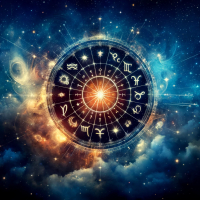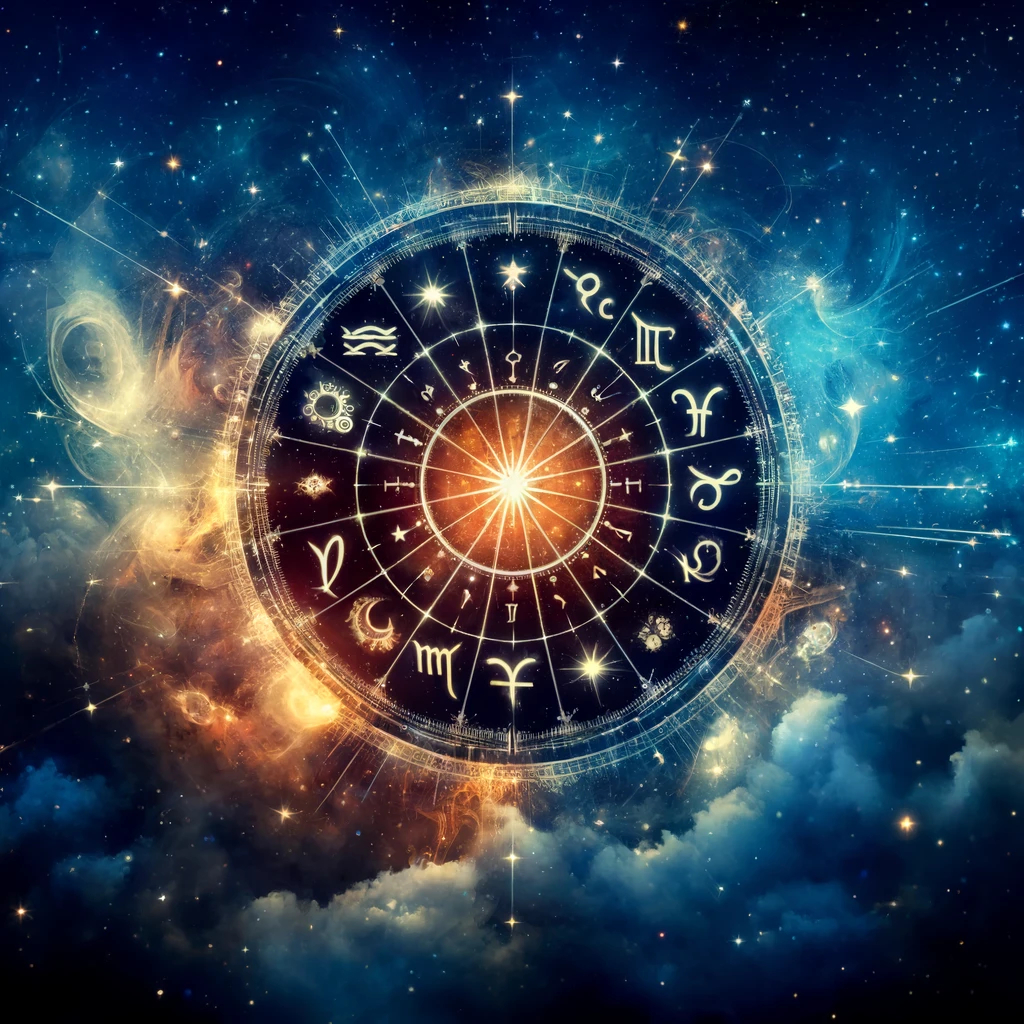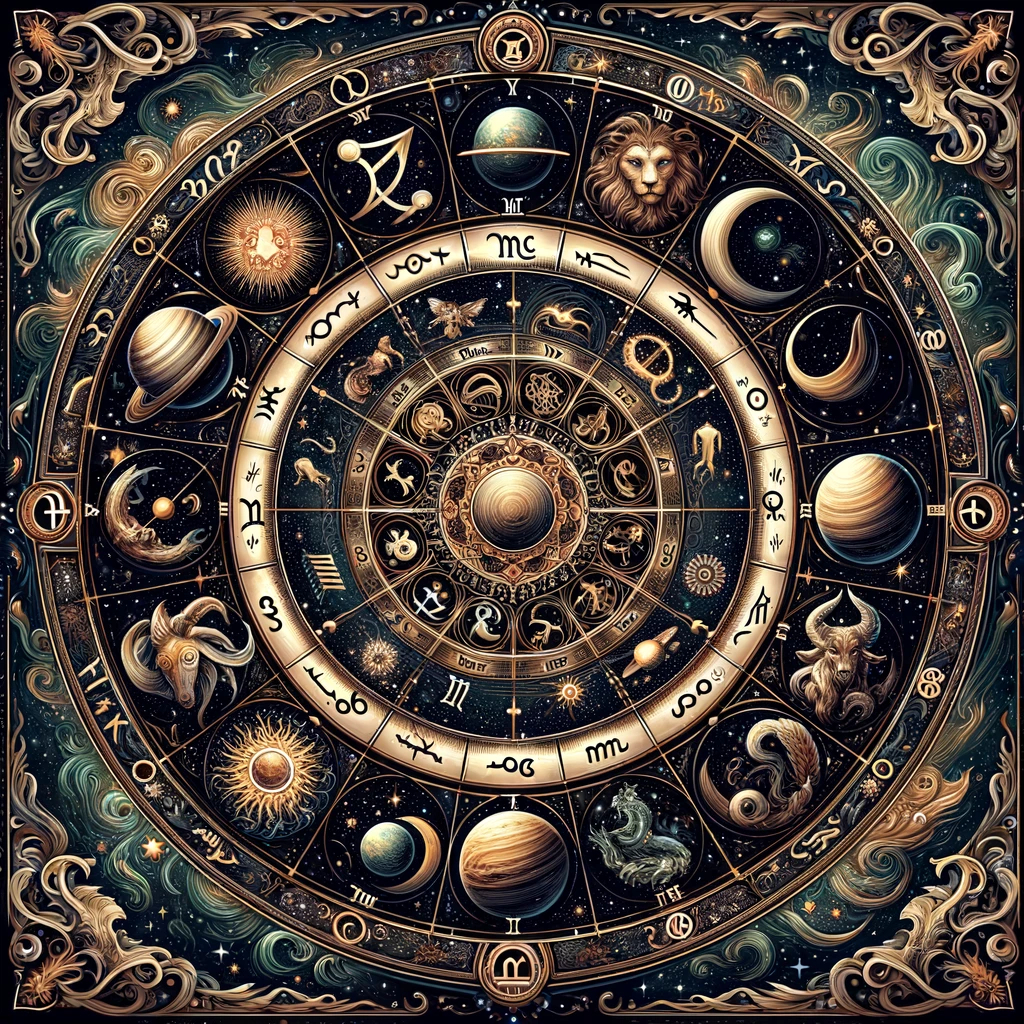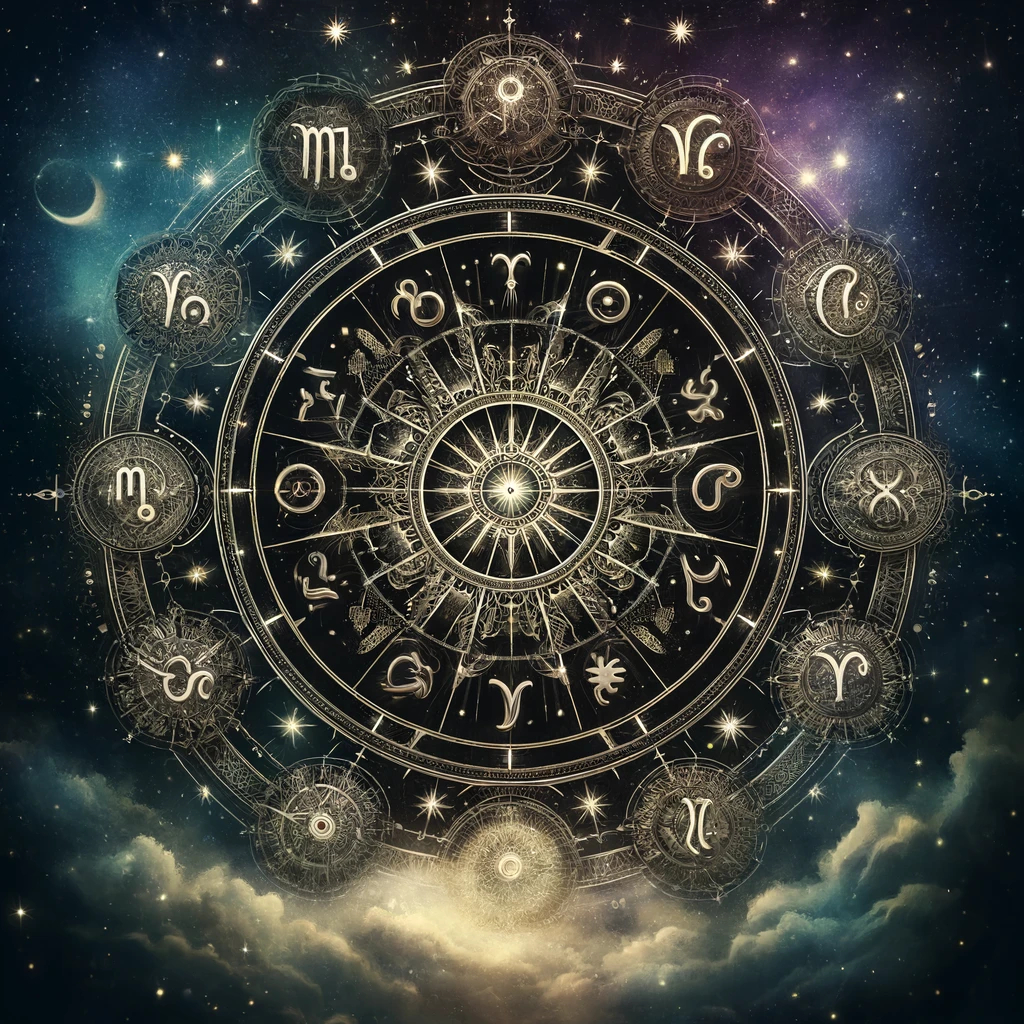Exploring the Astrology
 Exploring the Mysteries of Astrology delves into the rich history, from ancient Mesopotamia to modern interpretations. It covers the twelve zodiac signs, elements, and modalities, and explains the significance of the birth chart as a cosmic blueprint. The article discusses the influence of the planets, from the Sun and Moon to outer planets, and the importance of the houses in representing life areas. It also explores transits, progressions, and the impact of eclipses, as well as the insights offered by synastry and composite charts in relationships. Additionally, it touches on elective astrology for planning events and the relevance of astrology in modern life, providing tips for beginners and reflecting on the enduring mystique of astrology.
Exploring the Mysteries of Astrology delves into the rich history, from ancient Mesopotamia to modern interpretations. It covers the twelve zodiac signs, elements, and modalities, and explains the significance of the birth chart as a cosmic blueprint. The article discusses the influence of the planets, from the Sun and Moon to outer planets, and the importance of the houses in representing life areas. It also explores transits, progressions, and the impact of eclipses, as well as the insights offered by synastry and composite charts in relationships. Additionally, it touches on elective astrology for planning events and the relevance of astrology in modern life, providing tips for beginners and reflecting on the enduring mystique of astrology.
The History of Astrology
Welcome to the enchanting world of astrology, a timeless practice that has captivated the human imagination for millennia. The history of astrology is as vast and intricate as the cosmos itself, serving as a testament to humanity's enduring quest to understand the universe and our place within it. In this section, we embark on a journey through time, exploring the ancient origins, evolution, and cultural significance of astrology.
Ancient Origins
The roots of astrology can be traced back to the ancient civilizations of Mesopotamia, where the earliest recorded astrological observations date back to the 2nd millennium BCE. These early stargazers meticulously charted the movements of the stars and planets, believing that celestial phenomena held the key to understanding earthly events. The Babylonians, in particular, developed a sophisticated system of astrology that laid the foundation for much of what we know today.
Evolution Through the Ages
As astrology spread to other cultures, it underwent significant transformations. In ancient Egypt, astrology was intertwined with religion and used to predict the flooding of the Nile and other natural phenomena. The Greeks further refined astrological practices, incorporating philosophical concepts and introducing the zodiac system. During the Hellenistic period, the fusion of Babylonian, Egyptian, and Greek astrology gave rise to horoscopic astrology, which focuses on the individual's birth chart.
The spread of astrology continued through the Roman Empire and into the Islamic world, where scholars made significant advancements in astronomical observations and astrological calculations. The medieval period in Europe saw the integration of astrology into Christian thought, with prominent figures like Albertus Magnus and Thomas Aquinas acknowledging its influence. The Renaissance brought a renewed interest in astrology, with scholars like Ptolemy and Copernicus contributing to its development.
Astrology in Different Cultures
Astrology's journey through history is marked by its adaptation and integration into various cultural contexts. In China, astrology developed independently, with a focus on the lunar calendar and the concept of Yin and Yang. In India, Vedic astrology, or Jyotish, emerged as a vital part of Hindu culture, offering insights into karma and dharma. The Mayans and Aztecs of Mesoamerica also had their unique astrological systems, which were deeply connected to their calendars and cosmology.
Throughout its history, astrology has served as a bridge between the celestial and the terrestrial, offering a cosmic perspective on human affairs. Its enduring appeal lies in its ability to provide meaning and guidance in a complex and ever-changing world.

Understanding the Zodiac
The zodiac is a fundamental aspect of astrology, providing a celestial framework for interpreting the influence of the stars and planets on human affairs. In this section, we delve into the intricacies of the zodiac, exploring the twelve zodiac signs, their associated elements and modalities, and the significance of the personal planets in shaping our individual experiences.
The Twelve Zodiac Signs
The zodiac is divided into twelve signs, each corresponding to a 30-degree segment of the celestial sphere. These signs are Aries, Taurus, Gemini, Cancer, Leo, Virgo, Libra, Scorpio, Sagittarius, Capricorn, Aquarius, and Pisces. Each sign is associated with a specific set of characteristics and attributes that reflect the unique qualities of the individuals born under them. From the fiery assertiveness of Aries to the compassionate sensitivity of Pisces, the zodiac signs offer a rich tapestry of human diversity.
Elements and Modalities
The zodiac signs are further categorized into four elements: fire, earth, air, and water. Fire signs (Aries, Leo, Sagittarius) are known for their passion, energy, and creativity. Earth signs (Taurus, Virgo, Capricorn) are grounded, practical, and reliable. Air signs (Gemini, Libra, Aquarius) are intellectual, communicative, and adaptable. Water signs (Cancer, Scorpio, Pisces) are emotional, intuitive, and nurturing. Additionally, the signs are grouped into three modalities: cardinal, fixed, and mutable, which reflect their approach to life and change.
Personal Planets and Their Influence
In astrology, the personal planets (Sun, Moon, Mercury, Venus, and Mars) play a crucial role in shaping our personality and life experiences. The Sun represents our core identity and life purpose, while the Moon governs our emotions and inner world. Mercury influences our communication style and thought processes, Venus rules our values and relationships, and Mars drives our energy and assertiveness. By analyzing the positions of these planets in the zodiac signs and houses, astrologers can gain insights into an individual's character and potential.
Understanding the zodiac is a vital step in unlocking the mysteries of astrology. It provides a rich language for exploring the complexities of human nature and the cosmic influences that shape our lives.
The Birth Chart: A Cosmic Blueprint
The birth chart, also known as the natal chart, is a snapshot of the sky at the exact moment of your birth. It serves as a cosmic blueprint, revealing the positions of the planets and other celestial bodies in the zodiac. In this section, we'll explore the components of a birth chart, the significance of planetary positions, and the role of aspects in shaping your astrological profile.
Components of a Birth Chart
A birth chart is composed of several key elements, including the planets, zodiac signs, houses, and aspects. The planets represent various aspects of your personality and life experiences. The zodiac signs in which the planets are placed indicate the manner in which these energies are expressed. The houses, numbered one through twelve, correspond to different areas of life, such as relationships, career, and personal growth. The aspects, or angular relationships between planets, reveal the dynamic interactions between different parts of your psyche.
Interpreting Planetary Positions
The positions of the planets in your birth chart provide valuable insights into your character and destiny. For example, the placement of the Sun reveals your core identity and life purpose, while the Moon's position reflects your emotional nature and needs. Mercury's placement indicates your communication style, Venus governs your approach to love and values, and Mars represents your drive and assertiveness. By analyzing the planetary positions, astrologers can uncover your strengths, challenges, and potential for growth.
Aspects and Their Meanings
Aspects are crucial in understanding the complexities of your birth chart. They are formed when planets are a certain number of degrees apart, creating a relationship between their energies. Major aspects include the conjunction (0°), sextile (60°), square (90°), trine (120°), and opposition (180°). Each aspect has a distinct influence, with conjunctions indicating a blending of energies, sextiles promoting harmony and opportunity, squares creating tension and challenge, trines facilitating flow and ease, and oppositions highlighting balance and integration. By interpreting the aspects, astrologers can decipher the intricate dynamics of your personality and life path.
The birth chart is a powerful tool in astrology, offering a personalized map of the heavens that reflects your unique journey. By exploring the components, planetary positions, and aspects of your birth chart, you can gain profound insights into your nature and navigate your path with greater awareness and intention.
Planets and Their Significance
In astrology, the planets are considered celestial bodies that influence our lives in profound ways. Each planet governs specific aspects of our personality and experiences. In this section, we will explore the significance of each planet, from the luminaries, the Sun and Moon, to the outer planets, including Mercury, Venus, Mars, Jupiter, Saturn, Uranus, Neptune, and Pluto.
The Sun: Your Core Self
The Sun is the most important planet in astrology, representing your core identity, ego, and vital force. It signifies your inherent essence, your purpose in life, and your will to exist. The zodiac sign in which the Sun is placed in your birth chart determines your Sun sign, which is the basis of most horoscope readings. The Sun's position highlights your strengths, creative abilities, and the areas in which you are meant to shine.
The Moon: Your Emotional Landscape
The Moon, the second luminary in astrology, rules over your emotions, instincts, and subconscious mind. It reflects your inner world, your emotional needs, and how you nurture and seek comfort. The Moon's placement in your birth chart reveals your emotional nature, your intuitive abilities, and your deepest desires. It also influences your relationships, especially with women and maternal figures.
Mercury to Pluto: Personal to Generational Influences
Mercury, Venus, and Mars are known as the personal planets, as they move quickly through the zodiac and have a direct impact on your individual characteristics and day-to-day experiences. Mercury governs communication, intellect, and travel; Venus rules love, beauty, and values; and Mars represents energy, action, and desire.
Jupiter and Saturn are considered social planets, influencing broader aspects of your life, such as growth, opportunities, and social structures. Jupiter is associated with expansion, luck, and philosophy, while Saturn is linked to discipline, responsibility, and limitations.
The outer planets, Uranus, Neptune, and Pluto, are generational planets, as they move slowly through the zodiac and shape collective experiences and trends. Uranus symbolizes innovation, rebellion, and sudden changes; Neptune governs dreams, illusions, and spirituality; and Pluto represents transformation, power, and regeneration.
Understanding the influence of each planet in your birth chart provides a deeper insight into your personality and life path. By exploring the planets and their significance, you can uncover the cosmic forces that shape your destiny.

The Houses: Areas of Life Experience
In astrology, the houses represent different areas of life experience and provide context for interpreting the positions of the planets in your birth chart. Each house corresponds to specific life themes and activities. In this section, we'll explore the significance of the twelve houses and how they influence your life.
Overview of the Twelve Houses
The astrological chart is divided into twelve houses, each associated with different aspects of your life. The first house, or the Ascendant, represents your identity and outward personality. The second house relates to your values, possessions, and financial security. The third house is about communication, siblings, and short journeys. The fourth house, or the Imum Coeli, deals with your home, family, and roots.
The fifth house is linked to creativity, romance, and children. The sixth house concerns health, work, and daily routines. The seventh house, or the Descendant, governs partnerships and close relationships. The eighth house is associated with transformation, sexuality, and shared resources. The ninth house represents higher education, travel, and philosophy. The tenth house, or the Midheaven, relates to your career, reputation, and public life.
The eleventh house is about friendships, groups, and aspirations. Lastly, the twelfth house is connected to the unconscious, secrets, and spiritual growth. Each house provides a unique lens through which to view the influence of the planets in your birth chart.
Significance of Each House
The houses in your birth chart reveal the areas of life that are most important to you and where you are likely to experience growth, challenges, and opportunities. The planets and signs located in each house offer insights into your potential and the dynamics of various life experiences. For example, a strong emphasis on the fourth house may indicate a focus on family and home life, while planets in the tenth house could signify a drive for career success.
Interpreting Planets in Houses
The placement of planets in the houses adds depth to your astrological profile. A planet in a particular house will express its energy in the area of life represented by that house. For example, Venus in the second house suggests a love of material comforts and a talent for attracting wealth, while Mars in the sixth house indicates a strong work ethic and a proactive approach to health.
By understanding the significance of the houses and interpreting the planets within them, you can gain a comprehensive view of your life path and the areas where you can shine or need to overcome obstacles.
Transits and Progressions: Astrology in Motion
Astrology is not just a static snapshot of the sky at the moment of your birth; it is a dynamic and ever-evolving practice. Transits and progressions are two key methods used by astrologers to understand how the current positions of the planets interact with your natal chart, indicating potential trends and events in your life. In this section, we'll explore the concepts of transits and progressions and their impact on your astrological journey.
Understanding Transits
Transits occur when a planet in the sky today forms an aspect with a planet or point in your birth chart. These movements can activate different areas of your life, triggering changes, challenges, or opportunities. For example, if transiting Jupiter forms a conjunction with your natal Venus, it might indicate a period of growth and abundance in love and finances. Transits can be short-term, like those of the Moon, or long-term, like those of Saturn or Uranus, each bringing different levels of influence and significance.
Progressions: Personal Evolution
Progressions are a more subtle and internal form of astrological timing. They represent the symbolic evolution of your natal chart over time, reflecting your personal growth and development. The most commonly used progression is the secondary progression, where each day after your birth is equated to one year of life. For example, the position of the Sun 30 days after your birth represents your Sun's position when you are 30 years old. Progressions can highlight periods of internal change and shifts in your perspective or life direction.
The Impact of Eclipses
Eclipses are significant astrological events that can bring about profound changes and revelations. They occur when the Sun, Moon, and Earth align, either partially or completely blocking the Sun (solar eclipse) or the Moon (lunar eclipse). Eclipses are often associated with endings and beginnings, acting as catalysts for growth and transformation. Their influence can be felt in the weeks leading up to and following the eclipse, and they can activate specific areas of your birth chart depending on where they fall.
By understanding transits, progressions, and the impact of eclipses, you can gain insights into the dynamic nature of astrology and how it reflects the ongoing changes and developments in your life. These astrological movements offer guidance and perspective, helping you navigate your path with greater awareness and clarity.
Relationship Astrology: Synastry and Composite Charts
Astrology offers valuable insights into the dynamics of relationships, helping us understand the connections and challenges between individuals. In this section, we'll explore the concepts of synastry and composite charts, two powerful tools in relationship astrology that shed light on the nature of our interactions with others.
Synastry: The Astrology of Relationships
Synastry is the comparison of two individuals' birth charts to assess the compatibility and potential challenges in their relationship. By analyzing the aspects and placements of planets in each person's chart, astrologers can identify areas of harmony and tension. For example, Venus in one chart forming a trine with Mars in the other chart may indicate strong romantic attraction, while a square between one person's Sun and the other's Moon could suggest emotional conflicts. Synastry helps us understand the underlying dynamics of our relationships and how to navigate them effectively.
Composite Charts: The Relationship as an Entity
A composite chart is created by combining the midpoints of the planets and angles in two individuals' birth charts. This chart represents the relationship itself as a separate entity, revealing its strengths, challenges, and overall character. By examining the composite chart, couples can gain insights into the core themes of their relationship, its purpose, and how it evolves over time. The composite chart provides a broader perspective on the relationship, highlighting its potential for growth and development.
Understanding Karmic Connections
Relationship astrology also delves into the concept of karmic connections, exploring the idea that some relationships are destined or carry lessons from past lives. Aspects such as the North Node (representing life lessons) in aspect with personal planets in synastry can indicate significant karmic ties. These connections often bring about profound growth and transformation, as they challenge us to evolve and fulfill our soul's journey.
By utilizing the tools of synastry and composite charts, relationship astrology provides a deeper understanding of the dynamics at play in our connections with others. It offers a unique lens through which to view our relationships, helping us navigate the complexities of human interactions with greater awareness and compassion.
Elective Astrology: Choosing the Right Time
Elective astrology is a branch of astrology that focuses on choosing the most auspicious times for specific activities or events. This practice, also known as electional astrology, is based on the belief that the position of the planets at the time of an event can influence its outcome. In this section, we'll explore how elective astrology can be used to plan events and make important decisions.
What is Elective Astrology?
Elective astrology involves selecting a date and time for an event that aligns with favorable astrological conditions. This can be used for a wide range of purposes, from scheduling a wedding or business launch to choosing the best time for a medical procedure or signing a contract. The goal is to harness the positive energies of the planets to increase the likelihood of success and minimize potential challenges.
Using Astrology for Planning Events
When planning an event using elective astrology, astrologers consider various factors, including the positions of the Sun, Moon, and planets, as well as the ascendant and other important angles in the chart. For example, a wedding chart might be chosen to ensure Venus, the planet of love, is well-placed, while a business launch might prioritize a strong Jupiter for growth and prosperity. The Moon's phase and position are also important, as they can indicate the overall mood and flow of the event.
Case Studies: Successes and Challenges
There are many examples of successful events planned using elective astrology, from auspiciously timed product launches to well-received public speeches. However, it's important to note that while elective astrology can provide an advantage, it is not a guarantee of success. Other factors, such as preparation and execution, also play a crucial role. Astrologers often use case studies to illustrate the principles of elective astrology and to demonstrate how it can be applied in various contexts.
Elective astrology is a valuable tool for anyone looking to align their actions with the cosmic energies. By carefully selecting the timing of important events, we can work with the natural flow of the universe to achieve our goals and fulfill our aspirations.
Astrology and Modern Life
In our fast-paced, ever-changing world, astrology remains a relevant and insightful tool for understanding ourselves and the world around us. This section explores the role of astrology in modern life, including its psychological dimensions, digital presence, and future trends.
Psychological Astrology
Psychological astrology is a branch of astrology that combines astrological insights with psychological principles. It focuses on the inner workings of the individual, exploring the psychological underpinnings of astrological symbols and their influence on personality and behavior. This approach offers a deeper understanding of the self, helping individuals navigate their personal growth and development.
Astrology in the Digital Age
The digital age has transformed the way we access and interact with astrology. Online platforms, apps, and social media have made astrological information more accessible than ever before. Digital tools have also enhanced the precision of astrological calculations and chart interpretations. The internet has fostered a global community of astrology enthusiasts, facilitating the exchange of knowledge and experiences.
Future Trends in Astrology
As we look to the future, astrology continues to evolve and adapt to the changing landscape of society and technology. We can expect to see further integration of astrology with digital platforms and artificial intelligence, offering more personalized and interactive astrological experiences. Additionally, there is a growing interest in the intersection of astrology with other disciplines, such as wellness, spirituality, and environmental sustainability. The future of astrology promises to be as dynamic and diverse as the stars themselves.
Learning Astrology: Tips for Beginners
Embarking on the journey of learning astrology can be both exciting and overwhelming. This section provides tips and guidance for beginners who are eager to explore the mysteries of the cosmos and unlock the secrets of their own astrological chart.
Starting Your Astrological Journey
The first step in learning astrology is to familiarize yourself with the basic concepts, such as the zodiac signs, planets, houses, and aspects. Reading books, attending workshops, and exploring online resources can provide a solid foundation. Creating your own birth chart and beginning to interpret it is a practical way to apply what you've learned.
Resources for Learning Astrology
There are numerous resources available for those interested in learning astrology. Websites, blogs, and online forums offer a wealth of information and community support. Astrology books and journals provide in-depth knowledge and insights. Additionally, astrology apps and software can be valuable tools for generating charts and exploring different astrological techniques.
Building Your Astrological Practice
As you delve deeper into astrology, it's important to develop a consistent practice. Keeping a journal of your observations and reflections can help you track your progress and deepen your understanding. Engaging with the astrological community, whether through social media or local groups, can provide support and inspiration. Over time, you'll develop your own unique approach to astrology, integrating it into your life in meaningful ways.

Conclusion
The mysteries of astrology offer a vast and fascinating realm of exploration. From its ancient roots to its modern applications, astrology provides a unique lens through which to view the complexities of human life and the cosmos. Whether you're a seasoned astrologer or just beginning your journey, the stars hold endless wisdom and guidance, waiting to be discovered.
The Enduring Mystique of Astrology
Astrology's allure lies in its ability to connect us with the rhythms of the universe, offering insights into our innermost selves and the world around us. As we continue to explore its depths, astrology remains a beacon of light, guiding us on our path through the mysteries of existence.
Personal Reflections on Astrology
As we conclude this exploration of astrology, I invite you to reflect on your own experiences and beliefs. How has astrology impacted your life? What mysteries have you uncovered through your astrological journey? The beauty of astrology lies in its ability to inspire personal reflection and growth, encouraging us to look beyond the surface and embrace the wonders of the cosmos.
 Live Psychic Reading Service
Live Psychic Reading Service